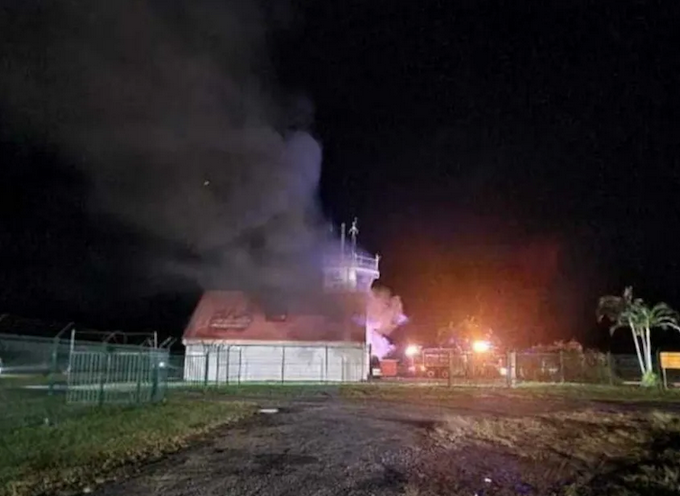
By Margot Staunton, RNZ senior journalist and Koroi Hawkins, RNZ Pacific editor
A Kanak political commentator in Aotearoa New Zealand says calls to separate New Caledonia into pro- and anti-independence provinces would worsen racial inequality in the Pacific territory.
Unrest continues in the capital Nouméa, with the nephew of New Caledonia Congress pro-independence president shot and killed at Saint Louis, and more armoured vehicles arriving from France.
The official death toll as a result of the unrest stands at 10, but there are reports that more people have died because emergency services could not reach them in time due to roadblocks.
- READ MORE: Other Kanaky New Caledonia crisis reports
- LISTEN TO RNZ PACIFIC WAVES: ‘New Caledonia’s economy has been very badly damaged by weeks of rioting and clashes’
Calls to divide the territory’s provinces are being pushed by loyalist and the French territory’s Southern Province President Sonia Backes.
Speaking at the weekend, Backes said the project of a New Caledonia institutionally united and based on living together with each other was “over”.
AFP news agency reported Backes had said that when two opposing forces were convinced they were legitimately defending their values, they were faced with a choice of fighting each other to the death or separating so they could live.
Political uncertainty in Paris is delaying the possibility of any kind of resolution in the troubled territory, which is also fraught with internal divisions among both the pro- and anti-independence camps.
Pockets of inequality
Auckland lawyer Joseph Xulue told RNZ Pacific “separatist ideology” would create pockets of inequality.
“The support in the region, particularly, support in respect of economic resources, administrative resources would almost certainly be pumped into the Southern Province if this were to eventuate because France would understand that those are the people who are loyal to them,” he said.
Xulue said Backes’ ideas went against the spirit of the Nouméa Accord.

“It was agreed to and formed on the basis that we would not have this kind of separatist ideology. It helps to assent the actual Accord’s document . . . [there’s a] stipulation that this would not happen.
“If Kanaky New Caledonia is going to advance beyond the actual Accord’s process.”
He added that Backes’ ideas would only worsen racial inequality in the archipelago.
‘Political reverberations’
Islands Business correspondent Nic Maclellan, who has been covering the French territory for decades, told RNZ Pacific the area where the latest death had been recorded had a long colonial history.
Maclellan said that in 1878 there was a revolt in the north and centre of the country, then in the 19th century, as the French military moved in attacking villages, many people fled to the outskirts of the capital.
He said nowadays Saint Louis was one of the areas where survivors from past conflicts had fled too.
“It has always been a hotspot, there has always been a level of criminal activity around people of St Louis. It is a strong community, largely Kanak,” he said.
“Police reports which is still under investigations suggest that a group of Kanaks were firing at a police drone. There was a exchange of gunfire between the Kanak activist and the members of the GIGN paramilitary unit and in that case a GIGN police officer shot and killed Rock [Victorin] Wamytan.”
Maclellan said the name of the dead man was symbolic in New Caledonia.
“[He] is nephew of Rock Wamytan, the current President of the Congress of New Caledonia who is a high chief of Saint Louis. So, beyond the allegations of criminal activity by this, this group of activists, it has also got political reverberations.”
French snap elections unhelpful
He said the French snap elections results both in mainland France and New Caledonia would continue to reverberate in months to come.
While the polls were predicting that the extreme right led by Marine Le Pen would win the largest bloc, and possibly a majority in the government, those polls turned out to be wrong.
Instead, a left alliance, known as the New Popular Front — an alliance of parties including the Greens, the Socialists, the Communist Party, and a large group led by Jean-Luc Mélenchon, France Unbowed, (LFI), have got the largest bloc.
However, Maclellan said no one had the absolute majority required to have the ruling numbers in the 577-seat French legislature in Paris.
“All in all, it is very complex, a fast-moving situation in Paris. We will see what happens.
“But the real problem for the Pacific is this level of uncertainty creates ongoing political, cultural, economic chaos that cannot be helpful at a time when New Caledonia’s economy has been very badly damaged by weeks of rioting and clashes between police and protesters,” he added.
New Zealand’s Deputy Prime Minister Winston Peters has said the Pacific as a whole should be concerned about ongoing unrest in New Caledonia.
The Pacific Islands Forum has been in direct contact with New Caledonia to discuss how to address this issue.
Peters said he hoped a plan was in place ahead of the Forum Leaders’ Meeting in Nuku’alofa next month.
“The long term Pacific future is all of our business. We have to hope that before we get to Tonga that there has been some sort of guideline of how we might go forward,” he said.
“Our view is that we have to ensure that there is a solution where we can help — help to rebuild if we can.”
This article is republished under a community partnership agreement with RNZ.









































